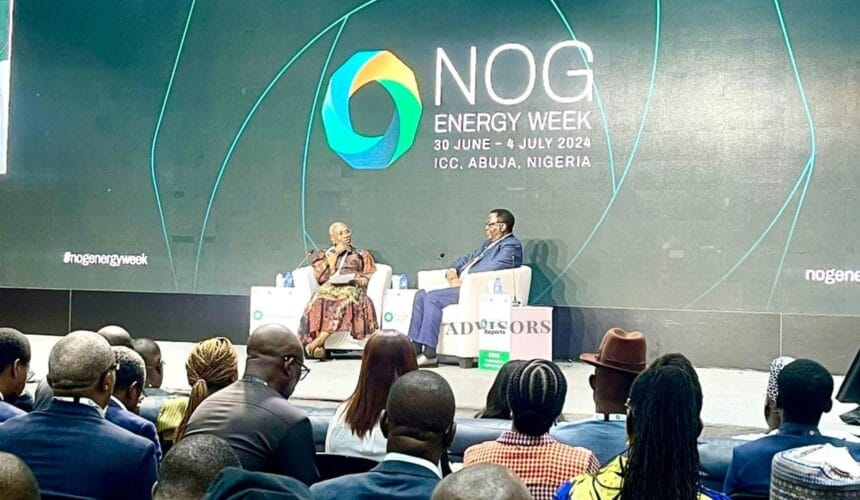… to weed out oil and gas service companies lacking capacity
“Entities acting solely as intermediaries, with no demonstrable capacity to execute project, shall not be approved”-Engr Ogbe
Oredola Adeola
The Nigerian Content Development and Monitoring Board (NCDMB) has announced five key measures to implement President Bola Tinubu’s directive on local content compliance in the oil and gas industry, which involves a stringent verification process to ensure that only indigenous oil and gas service companies with the necessary capabilities and capacity are approved to participate in projects.
The Board has therefore emphasized that the Federal Government will no longer approve entities that serve merely as intermediaries without the ability to execute the work.
Engr. Felix Ogbe, Executive Secretary, Nigerian Content Development and Monitoring Board, made this known in his address at the opening session at the Nigeria Content Seminar Session 1 of the 2024 NOG Energy Week in Abuja.
Advisors Reports confirmed that the NCDMB is taking steps to evaluate and possibly exclude oil and gas service companies deficient in capacity, aiming to enforce rigorous local content standards and prioritize firms capable of project execution over mere intermediaries.
According to him, it is encouraging that the Federal Government values the Local Content agenda.
The ES further stated that earlier this year, President Tinubu, issued a Presidential Directive on Local Content Compliance Requirements which seeks to further deepen local content in the Nigerian oil and gas industry while enhancing competitiveness, mitigating risks of approving unqualified contractors, improving the approval timeline, creating an enabling business environment in the Nigerian oil and gas industry.
Ogbe stated, “Among other obligations, the Board is required to establish procedures for its execution following the Presidential Directive and has therefore designated five focal areas for implementing the Presidential Directive.
He outlined five focal areas for implementing the directive:
*Promoting the Utilisation/Growth of In-Country Capacities: The Board will continue to leverage our existing processes to assess and verify the capacity of companies, facilitating and carrying out in-country Capacity Audits in collaboration with all relevant stakeholders.
The findings from this exercise will be employed to categorise and pre-qualify vendors, among other potential applications.
* Enhancing the Cost Competitiveness of Oil and Gas Projects: Among other activities, the second focal area will include allocating permission to operators to source capacities out-of-country only after in-country capacity gaps have been identified.
* Non-Inclusion of Intermediary Entities Lacking the Essential Capacity to perform from the Nigerian Content Plan (NCP). This focus area will use the tender opportunity’s pre-qualification and technical evaluation phases to eliminate entities that lack the essential capacity to perform.
*The Approval of Nigerian Content Plan (NCP), which consists of contractors that meet the legal definition of Nigerian Companies and demonstrate capacity to execute projects within Nigeria.
In this case, the Board will only acknowledge the necessity of international players’ participation when the necessary Nigerian Content level is unavailable locally or insufficient. The Board will accomplish this to guarantee Nigerian content’s continuous and quantifiable expansion.
The last focus area is that Entities acting solely as intermediaries, with no demonstrable capacity to execute the project or activity, shall not be approved.
Ogbe further emphasised that the Board is steadfast in its dedication to guarantee that any services provided will generate value in the country.
He said, “In addition, we will evaluate current policies and guidelines to encourage the development of indigenous capabilities and guarantee that these policies and guidelines are not misused, misapplied, or misinterpreted.
“We will present the modalities during this event and subsequent interactions with our stakeholders in detail.
“The Presidential Directive and our modalities are under the objectives of our 10-Year Strategic Roadmap, as they will significantly contribute to the deepening of Nigerian Content, which will ultimately help us achieve our overarching aim of increasing the level of Nigerian Content to 70% by 2027.
The NCDMB’s ES has therefore reiterated the Board’s unwavering dedication to implementing the Presidential Policy Directive on Local Content Compliance.
According to him, the Presidential Policy Directive, when fully implemented, will significantly impact Nigeria’s oil and gas industry, grow our economy, ensure cost competitiveness, and attract further investments to the industry and the country at large.
The ES therefore mentioned notable achievements under his leadership.
He said, “In December 2023, the Board inaugurated the Amal Technologies Gas Leak Detection Device and Printed Circuit Board manufacturing facility in Idu, Abuja.
“This facility marks a significant milestone in Nigeria’s oil and gas sector, showcasing advancements in research and technology innovation aimed at overcoming industry challenges.
“Additionally, in June 2024, the NCDMB, through its partnership initiatives, commissioned the NEDOGAS Kwale Gas Gathering and Injection Facility in Delta State.
“This facility plays a crucial role in supporting the Federal Government’s flare-out policy, underscoring efforts towards sustainable energy practices.
“Moreover, the Final Investment Decision (FID) on the Ubeta Field Development Project, undertaken by TotalEnergies Exploration and Production Nigeria Limited and its JV Partner, Nigerian National Petroleum Company Limited (NNPCL), represents another major accomplishment.
“This project is expected to enhance the country’s gas production capacity by over 350 million standard cubic feet per day, reflecting investor confidence in Nigeria’s oil and gas industry,” he stated.
Engr. Ogbe has therefore revealed that the NCDMB remains committed to fostering an enabling business environment that attracts further investments to Nigeria’s oil and gas sector.




